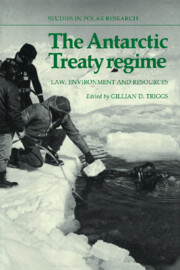Book contents
- Frontmatter
- Contents
- List of contributors
- List of Antarctic Treaty Parties
- Foreword
- Introduction
- Frontispiece: Map of national claims
- Part I Antarctica: physical environment and scientific research
- Part II The Antarctic Treaty regime: legal issues
- 4 Introduction
- 5 The Antarctic scene: legal and political facts
- 6 The Antarctic Treaty system: a viable alternative for the regulation of resource-oriented activities
- 7 The relevance of Antarctica to the lawyer
- 8 The Antarctic Treaty system: some jurisdictional problems
- Part III The Antarctic Treaty regime: protecting the marine environment
- Part IV The Antarctic Treaty regime: minerals regulation
- Part V Whither Antarctica? Future policies
- Part VI Conclusion
- Selected reading
- Appendix 1
- Appendix 2
6 - The Antarctic Treaty system: a viable alternative for the regulation of resource-oriented activities
Published online by Cambridge University Press: 20 January 2010
- Frontmatter
- Contents
- List of contributors
- List of Antarctic Treaty Parties
- Foreword
- Introduction
- Frontispiece: Map of national claims
- Part I Antarctica: physical environment and scientific research
- Part II The Antarctic Treaty regime: legal issues
- 4 Introduction
- 5 The Antarctic scene: legal and political facts
- 6 The Antarctic Treaty system: a viable alternative for the regulation of resource-oriented activities
- 7 The relevance of Antarctica to the lawyer
- 8 The Antarctic Treaty system: some jurisdictional problems
- Part III The Antarctic Treaty regime: protecting the marine environment
- Part IV The Antarctic Treaty regime: minerals regulation
- Part V Whither Antarctica? Future policies
- Part VI Conclusion
- Selected reading
- Appendix 1
- Appendix 2
Summary
The Treaty system as an alternative to sovereignty and universality
The current debate about the various alternatives for the regulation of activities in Antarctica is not at all new. Ever since international law became interested in questions posed by polar exploration, with particular reference to the issue of resource exploitation – an interest that was already evident by the beginning of the century – the various alternatives conceivable in legal and political terms were brought into play. Two basic proposals dominated the debate. The first purported to apply the traditional modalities of the organization of the modern state to Antarctica, extending the concept of sovereignty, with the necessary variations imposed by geography, climate and distance, to the polar regions. The second dominant approach sought to negate such a possibility and to introduce, instead, forms of international organization that were generally of a global nature and on a world-wide scale.
The approach relying on sovereignty alone proved not to be a viable alternative for the regulation of the activities of man in Antarctica. The reason for this was not strictly of a legal nature, and it was certainly entirely unrelated to the question of recognition or validity in international law. Rather it was one of political realities. Conflict and confrontation were constant features of the struggle between national sovereignties competing to become established, and such characteristics could not be the basis on which to found an effective Antarctic regime. On the other hand, this approach did not properly take into account other relevant interests which were present in Antarctica, thereby also affecting the viability of this alternative.
- Type
- Chapter
- Information
- The Antarctic Treaty RegimeLaw, Environment and Resources, pp. 65 - 76Publisher: Cambridge University PressPrint publication year: 1987
- 2
- Cited by



